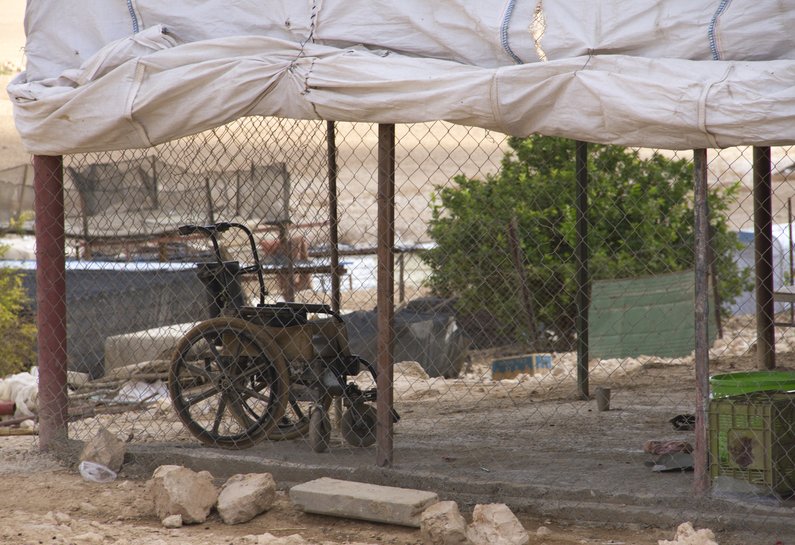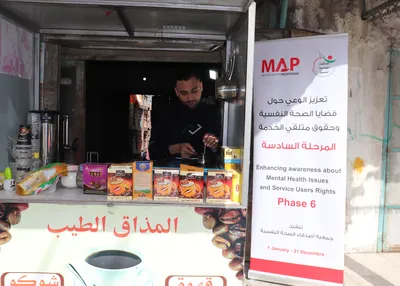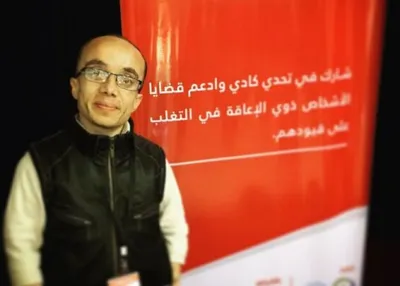MAP briefs the UN on barriers to disability rights in the occupied Palestinian territory

Palestinians with disabilities played an active role in identifying the issues raised in the briefing, providing information to MAP through focus groups, interviews and a participatory photography project.
MAP’s briefing shows how the policies and practices of Israel through its prolonged occupation of the oPt and its illegal closure and blockade of Gaza obstruct Palestinians with disabilities from the full enjoyment of their rights.
Context and legal framework
According to the Palestinian Central Bureau of Statistics, 255,224 people in the oPt have a disability, comprising 6.8% of the population in Gaza and 5% in the West Bank. One fifth of Palestinians with disabilities are children.
As the occupying power in the West Bank, including East Jerusalem, and Gaza since 1967, Israel is bound by its duties under international humanitarian law in the oPt. It is obligated to respect, protect and fulfil the human rights of the Palestinian population under its effective control in the oPt, including those with disabilities.
Barriers to disability rights in Palestine
In Gaza, Israel’s illegal and intensified closure regime, imposed since 2007, is a key driver of humanitarian needs and economic near-collapse. Some 96% of aquifer water is undrinkable, 68% of people are food insecure, and 80% of people are dependent on some form of international assistance.
These poor socioeconomic conditions disproportionately impact persons with disabilities, with UN OCHA assessing that people with disabilities in Gaza “are among the most vulnerable groups in a society already in crisis.” Where unemployment among Gaza’s general population has reached 47%, among those with disabilities it is as high as 90%.
Limited electricity supply and frequent power cuts impede the rights of Palestinians with disability in Gaza, for instance preventing those with physical disabilities from using lifts to exit their homes and charging electric wheelchairs. This issue is now exacerbated by Israel’s closure of the Karem Abu Salem (Kerem Shalom) crossing since 11 August, suspending the import of fuel and causing Gaza’s only power plant to close down. Residents have as little as 3-4 hours of electricity per day.
Inadequate protection during hostilities and excessive use of force
MAP’s submission further outlines how, during its military offensive on Gaza in 2014, Israel failed to take “all necessary measures to ensure the protection and safety of persons with disabilities in situations of risk, including situations of armed conflict” as it is obliged to under Article 11 of the CRPD. It includes the tragic story of one of MAP’s beneficiaries, a 17-year-old girl with a physical disability, who died from smoke inhalation after being unable to be safely evacuated from her home during an Israeli military attack in August 2014.
Israel’s use of excessive, disproportionate and indiscriminate force and lethal force against Palestinian civilians, including people with disabilities, is regularly reported by local Palestinian and Israel human rights organisations. In 2017, Al-Haq documented the killing of 10 Palestinians with disabilities, finding that “Israel rarely carries out genuine or impartial investigations into cases of killings involving Palestinians, thus fostering a prevailing culture of impunity.” Israel’s failure to ensure effective access to justice for people with disabilities violates Article 13 of the CRPD.
This issue reached international attention when Eyad Hallaq, a Palestinian man with autism and a mild learning disability, was fatally shot by Israeli police while on his way to the Elywn El Quds Occupational Training Centre in the Old City of East Jerusalem on 30 May 2020. In August, a 60-year-old Palestinian man with a hearing impairment was shot and injured by Israeli forces at a checkpoint after being unable to hear an order to stop.
Palestinians with disabilities disproportionately affected by COVID-19
MAP’s submission describes how the outbreak of COVID-19 has exacerbated the pre-existing marginalisation and discrimination against people with disabilities in the oPt and barriers to the full enjoyment of their human rights. As OCHA highlighted:
“People with seeing, hearing or mobility issues, already experience difficulty in accessing services and information in the oPt, now exacerbated as they seek to protect themselves from the outbreak. Many persons with disabilities depend on services that have been suspended and families report not having enough money to stockpile the specific food and medication.”
During this crisis, one of the wheels of my wheelchair broke, and I still can’t find anyone who can fix it.
Abdelkarem, a Palestinian man in Gaza who has a physical disability, told MAP this:
“I’ve had no income during this crisis. Even though I’ve never had a stable income, I usually managed to get some cash by participating in trainings or short-term projects. I need medication on a monthly basis, but the organisation that usually provides me with this is closed. I now have to go to the pharmacy and pay for the medicine myself. I managed this for two months, but I don’t think I can afford it for a third month. Generally, in Gaza we have an issue with repairing assistive devices or accessing new ones. I once spent three years looking for a new commode after mine broke. During this crisis, one of the wheels of my wheelchair broke, and I still can’t find anyone who can fix it.”
Mental health in the occupied Palestinian territory
The submission closes warns that Israel’s occupation and closure undermine the population’s quality of life and are key drivers of psychological distress. Dr Yasser Abu Jamei, Director of the Gaza Community Mental Health Programme (GCMHP), described to MAP the burden placed on the mental health of Gaza’s population:
“The population in Gaza feels suffocated, beyond suffocation the mental health situation in Gaza is one that can be described as heavy with despair, feelings of frustration, and loss of hope. Some children we have been working with who have had PTSD are relapsing because the external environment does not aid their healing and treatment. Since these children remain in the same environment, exposed to these same levels of trauma triggers, they will surely relapse.”
To read MAP’s submission in full, click here. You can also read more about MAP's photography project with Palestinians living with disabilities in Gaza here.
Related content


